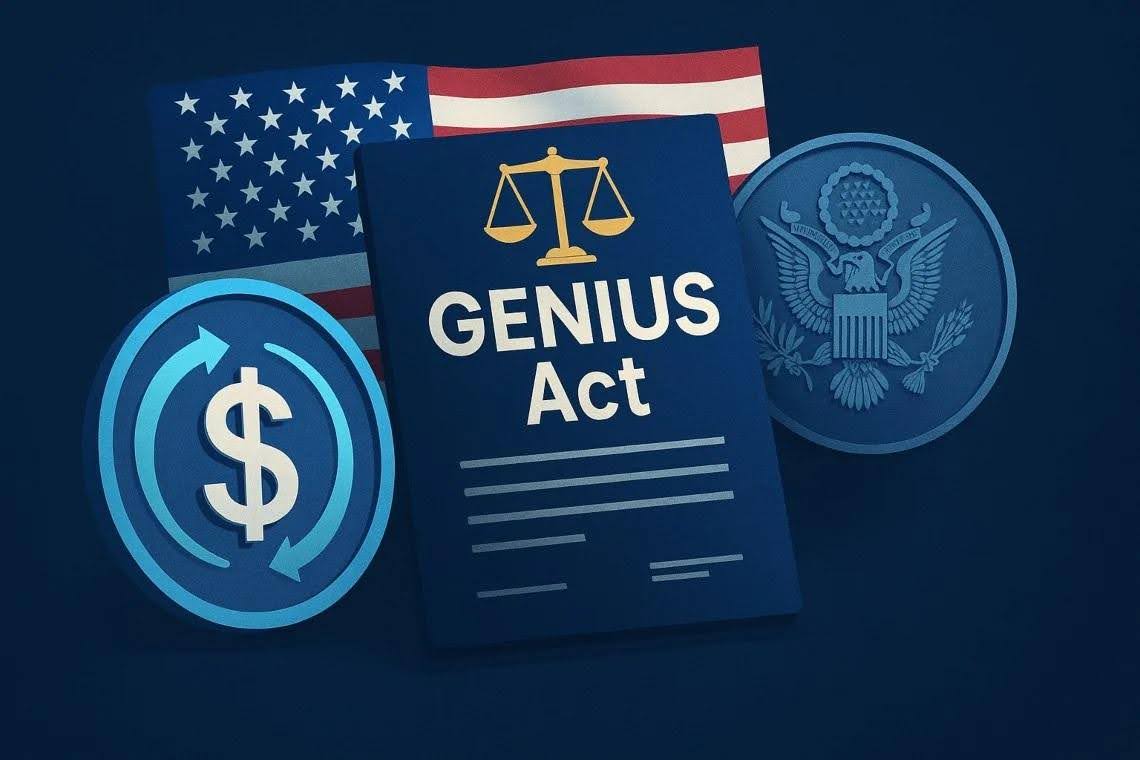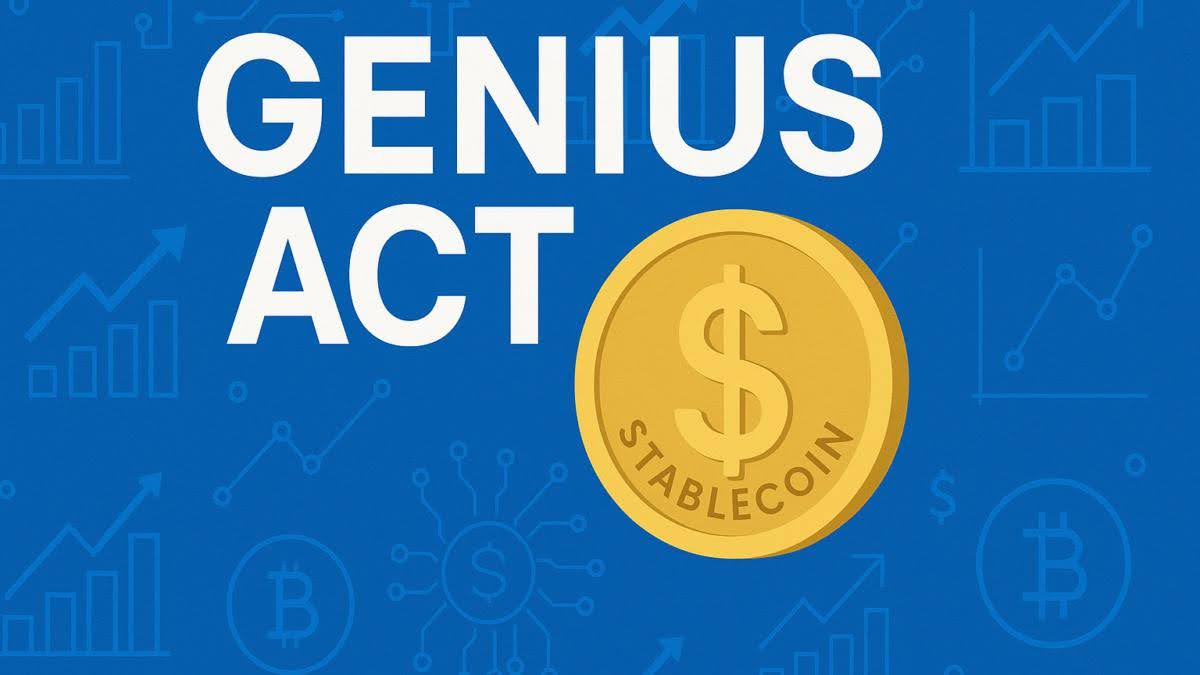What Is the GENIUS Act? Understanding the Fundamentals
The GENIUS Act — whose formal title is Guiding and Establishing Nationwide Innovation for U.S. Stablecoins Act — will signify essentially the most important leap ahead in U.S. monetary legislation, a transparent assertion from Washington that fee stablecoins is a elementary a part of the rising digital financial system. The place different regulatory proposals have been broad, basic and targeted extra broadly on crypto belongings, the GENIUS Act takes a focused strategy to fee targeted stablecoins evaluating them to, for instance, algorithmic tokens, commodity backed crypto, or different decentralized finance devices.
As an alternative of imposing a one-size-fits-all regulatory strategy, the GENIUS Act establishes a two-tiered regulatory framework which permits federal and eligible state regulators to license and supervise stablecoin issuers. This versatile structure permits current state-chartered entities direct entry to the modular monetary system and preserves a strong federal security web — a design precept that’s meant to commerce off innovation and systemic danger administration.

Learn Extra: U.S. Senate Passes the GENIUS Act — What’s Actually Contained in the $3.7 Trillion Crypto Invoice?
As digital counterparts to fiat — and the U.S. greenback specifically — stablecoins are being woven ever extra deeply into the material of remittance platforms, blockchain settlements, e-commerce and cellular finance. The GENIUS Act supplies an essential coverage reply: how one can regulate dollar-pegged digital currencies with out unduly stifling their utility and risk for innovation.
Furthermore, the invoice incorporates language that helps a spread of regulatory goals, together with anti-money laundering (AML), countering terrorist financing (CTF), and systemic danger prevention — such that the US adoption of stablecoins doesn’t depart regulatory gaps or weak factors within the nationwide monetary construction.
How GENIUS Act Begins? Who Helps It?
The GENIUS Act didn’t seem in a single day. It got here amid mounting strain for lawmakers, regulators and {industry} leaders to provide you with clear federal guidelines for stablecoins, after years of fragmented oversight. Its path demonstrates bi-partisan cooperation and thorough evaluation – placing the U.S. on observe to turn into a world chief in the way it regulates digital belongings.
October 2024: A public draft of the GENIUS Act was printed, inviting suggestions from {industry}, client safety entities, in addition to the general public.February 2025: Then it was formally launched within the Senate by Sen. Tim Scott, after months of working with finance and crypto stakeholders.March 2025: The Senate Banking Committee authorised the invoice with almost 40 amendments provided by either side, on points from reserve necessities to state-federal coordination.Might 19, 2025: The Senate authorised the GENIUS Act in a 66–32 vote, with nearly each Republican supporting it and 5 Democrats dissenting — a breakthrough second for stablecoin coverage.
Learn Extra: Senate Shocker: 15+ Democrats Flip as GENIUS Act Clears Key Hurdle in 66-32 Vote
Listed here are some key supporters behind the invoice:
Senator Tim Scott (South Carolina): The invoice’s lead sponsor, Senator Scott serves because the Chairman of the Senate Banking Committee and moved the laws to create regulatory certainty for the digital financial system.Senator Invoice Hagerty (Indiana): Pushed for fintech-friendly insurance policies and superior innovation in digital belongings underneath sound supervision.Senator Kirsten Gillibrand (New York): Longtime Supporter of Wise Crypto Laws and Coauthor of earlier digital asset payments.Senator Cynthia Lummis (Wyoming): Chair of the Senate’s first Subcommittee on Digital Property, this brings deep experience and management on blockchain points.Senator Angela Alsobrooks (Maryland): One other younger lawmaker, who noticed the passage of the GENIUS Act as a smart regulatory strategy for the longer term.


The invoice additionally acquired sturdy assist from the crypto {industry}. Ripple CEO Brad Garlinghouse described the GENIUS Act because the U.S.’s most vital monetary laws since Dodd-Frank, and added that the invoice proved that it’s doable to stability know-how with accountability. Different digital asset firms, like Coinbase, additionally praised the readability the invoice affords.
With Senate approval now in hand, the GENIUS Act heads to the Home, the place it ought to additional codify the U.S. stance on stablecoins and form worldwide coverage on digital finance.
What Does the GENIUS Act Goal for?
The GENIUS Act is targeted on the buyer and monetary safety points of this space by creating a strong federal construction for regulating fee stablecoins. It’s simply good standard-setting, which raises transparency, blocks abuse, and lowers systemic danger. The important thing tenets of the GENIUS Act are summarized as follows:
Objective 1: Guarantee Full Reserve Backing for Stablecoins
All fee stablecoins ought to have to take a position 100% reserves in U.S. {dollars}, short-term Treasuries, or different devices authorised by regulators.This goals to stop depegging and ensures stablecoins keep their 1:1 worth.
Objective 2: Improve Transparency By way of Public Disclosures
Issuing banks need to publicly disclose their reserve make-up on a month-to-month foundation.Issuers with greater than $50 billion in market cap must disclose annual audited monetary statements.These make it doable for shoppers to belief issuers and for buyers to find out the solvency.
Objective 3: Prohibit Deceptive Advertising and Model Misuse
It’s illegal for any issuer to market stablecoins as being:• Assured by the U.S. authorities• Lined by FDIC insurance coverage• Backed by the total religion and credit score of the USStablecoins should not be marketed in a approach that leads shoppers to consider they’re authorized tender or government-issued.


Objective 4: Stop Destabilizing Market Runs
The act enforces strict reserve asset guidelines to mitigate dangers, together with:• Diversification necessities for reserves• Bans on holding riskier belongings like company debt or equities• Rate of interest danger administration requirements• Capital and liquidity danger administration necessitiesThese measures shield in opposition to sudden withdrawals or market shocks.
Objective 5: Make clear the Position of State vs. Federal Oversight
The GENIUS Act permits certified state regulators to supervise issuers—however provided that their frameworks are “considerably related” to federal requirements.Issuers exceeding $10 billion in issuance should:• Come underneath federal oversight,• Search a waiver, or• Stop new token issuance in the event that they fail to conform.
Objective 6: Defend Stablecoin Holders in Insolvency Circumstances
Stablecoin holders have precedence claims over all different collectors within the occasion of issuer chapter.The act mandates expedited court docket critiques and ensures reserves are returned shortly and pretty to token holders.
What Are the Professionals and Cons of the GENIUS Act?
What the GENIUS Act will get by way of advantages nevertheless, it does lose in buying honest critiques amongst {industry} contributors.
The professionals of the GENIUS Act are listed under:
Enhanced Client Belief: Guidelines of the highway and reserve necessities will instill a heightened belief in stablecoin issuers.Market Stability: Outlined regulatory construction might cut back the chance of runs and systemic shocks.Readability for Innovators: Builders and buyers now have a roadmap for compliance.Nationwide Safety Advantages: AML/auditing necessities promote monetary transparency.
The cons of the GENIUS Act are listed under:
Compliance Prices for Startups: Smaller issuers might wrestle to satisfy reserve and audit requirements.Threat of Overregulation: Extreme oversight would possibly stifle fast innovation.Federal-State Friction: Federal and states regulators is probably not properly coordinated, which could create delays or clashes.Exclusion of Algorithmic Stablecoins: The invoice doesn’t embrace non-collateralized stablecoins, and thus fails to seize an entire class of stablecoins.


What Are the Principal Factors of the GENIUS Act?
Moderately than simply imposing reserve necessities or a ban on misleading advertising and marketing, the GENIUS Act 2025 adopts a layered regulatory framework, which suggests a nuanced understanding of fee stablecoins’ place within the wider monetary system. The legislation covers extra than simply cursory oversight—it’s an offensive blueprint to deliver stablecoins into the U.S. monetary system whereas holding systemic danger, client safety, and nationwide competitiveness in examine.
Under are the key components and less-discussed however equally essential provisions that type the core of the GENIUS Act:
Institution of a New Regulatory Class: “Permitted Fee Stablecoins”
One of the crucial foundational contributions of the GENIUS Act is the authorized categorization of a brand new class of digital belongings referred to as “Permitted Fee Stablecoins.” This classification:
Distinguishes stablecoins which can be used for client transactions from different digital belongings, akin to utility tokens or funding contracts.Mandates all stablecoin issuers to need to acquire a proper designation and approval in the event that they wish to flow into stablecoins inside this part.Clears approach for stablecoins to one-day plug into mainstream fee infrastructures – banking apps, service provider platforms or remittance corridors.
This step opens the gates for mass adoption by institutional and retail fee suppliers.
Interagency Coordination and Regulatory Roles
The GENIUS Act doesn’t consolidate stablecoin regulation underneath a single company, as a substitute requiring cooperation amongst a number of federal regulators, akin to:
The Federal Reserve: Systemic danger oversight and affect on financial coverage.The OCC (Workplace of the Comptroller of the Forex): Regulates stablecoin-issuing firms that resemble digital banks.The SEC and CFTC: Ensures that stablecoin exercise doesn’t run afoul of securities or commodities legislation.
This strategy mirrors a hybrid oversight framework like that holding sway over conventional monetary entities; stablecoins reduce throughout the strains of funds, funding and systemic infrastructure.
Regulatory Set off Thresholds Based mostly on Scale
The act additionally introduces a tiered regulatory framework the place the diploma of oversight escalates with the issuer’s market dimension. As an illustration:
Issuers with market capitalization underneath $10 billion can function underneath state regulation, offered their framework aligns with federal requirements.As soon as they exceed $10 billion, they have to search further oversight by a federal fee stablecoin regulator, request a waiver, or stop additional issuance.
This dynamic construction ensures early-stage innovators should not overburdened, whereas large-scale issuers face sturdy safeguards on account of their potential to affect nationwide monetary stability.
Chapter Course of Acceleration and Authorized Precedence
In case of issuer insolvency, the GENIUS Act introduces judicial mechanisms to expedite the chapter course of:
It mandates that reserves backing permitted stablecoins be promptly distributed to holders, minimizing losses and uncertainty.The act grants first-priority creditor standing to stablecoin holders, overriding claims from buyers, distributors, and even inner shareholders.
This provision turns stablecoins right into a safer asset class by giving customers clear, court-enforced recourse—an innovation hardly ever seen within the digital asset world till now.
Regulatory Enforcement Powers and Penalties
One other important level is the GENIUS Act’s provision for civil and felony enforcement mechanisms. These embrace:
The power for regulators to nice or shut down issuers who misrepresent reserve holdings or market non-compliant stablecoins.Expanded powers to pursue cross-border enforcement, particularly in collaboration with overseas regulators the place stablecoins function globally.
The inclusion of sturdy enforcement provisions elevates the act from a compliance information to a highly effective authorized instrument, enabling significant accountability.
Clarification of Authorized Standing in Commerce
The act additionally helps make clear the place and the way permitted fee stablecoins can be utilized by defining:
That they’re not authorized tender, and can’t be pressured as a technique of debt settlement except agreed upon by each events.That they will, nevertheless, be used for digital commerce, payroll, cross-border funds, and different features so long as they adjust to regulatory permissions.
This clarification reduces friction between conventional authorized programs and Web3 fee programs and opens room for company adoption with out authorized ambiguity.
Stopping “Shadow Stablecoins” and Model Misuse
In an effort to cease confusion and fraud, the act consists of sturdy provisions round naming rights and client notion:
Solely belongings authorised underneath the GENIUS framework could also be known as “fee stablecoins.”It’s unlawful to design person interfaces, pockets experiences, or branding that counsel regulatory approval the place none exists.
This provision successfully eliminates the grey zone of pseudo-stablecoins and protects shoppers from misleading UI/UX tips or deceptive app retailer listings.
Help for Technical Auditing and Threat Modeling Requirements
The act additionally mandates collaboration with tutorial and monetary analysis establishments to create:
Technical requirements for stress testing and reserve simulations.Threat disclosure frameworks for issuers to share operational and technological danger assumptions with regulators and the general public.
This brings a degree of scientific and engineering rigor to crypto that has lengthy been lacking and alerts the U.S. intent to steer not simply by means of coverage, however by means of technical excellence.
Encouragement of Innovation By way of Authorized Readability
By clearly defining which actions are permitted and which aren’t, the GENIUS Act:
Removes uncertainty for builders and builders, unlocking innovation by eliminating regulatory concern.Encourages enterprise capital and institutional funds to re-enter the area, particularly these beforehand sidelined by lack of federal readability.Positions the U.S. as a “rules-based innovation hub” for digital finance, rivaling jurisdictions like Singapore, Switzerland, or the UAE.


GENIUS Act vs. Secure Act: A Detailed Comparability
Whereas the GENIUS Act focuses on fostering innovation with safeguards, the Secure Act is usually seen as extra restrictive and enforcement-heavy.
FeatureGENIUS ActStable ActDefinitionEstablishes a versatile federal framework for fee stablecoinsRequires all stablecoin issuers to acquire financial institution charters and FDIC insurance coverageRegulatory PhysiqueShared between federal businesses and state regulatorsPrimarily federal oversight through the Federal Reserve and OCCReserve Necessities100% reserve backing with money or Treasuries100% reserve backing with bank-level requirementsInnovation MethodEncourages compliant innovationFocuses on client safety by means of heavy enforcementAdvertising RestrictionsExpress bans on deceptive authorities affiliationBroad restrictions with felony penalties
Regulatory Method
The GENIUS Act and the Secure Act each search to manage stablecoins within the U.S., however they differ considerably in how they strategy oversight. Whereas the GENIUS Act helps innovation by means of a versatile, risk-based framework, the Secure Act adopts a extra restrictive mannequin rooted in conventional banking oversight.
GENIUS Act:Focuses on making a federal framework that encourages accountable innovation by permitting non-bank entities to problem stablecoins underneath clear regulatory requirements. It introduces tiered oversight relying on issuer dimension, helps state-federal coordination, and emphasizes transparency, danger administration, and client safety with out stifling startups or new entrants.Secure Act:Centralizes monetary exercise round banks and the Federal Reserve, insisting that each one stablecoin issuers should be chartered as banks and supervised as full-service nationwide banks by the federal authorities. It emphasizes monetary stability and the prevention of systemic danger, however critics say it might stifle innovation by proscribing who can problem stablecoins, permitting solely regulated banks.
Impression on Trade
Fintechs and Startups: The GENIUS Act embraces modular compliance whereas the Secure Act might kneecap non-bank gamers.Banks: GENIUS encourages partnerships with tech companies; Secure Act reinforces financial institution dominance.Retailers and Tech Giants: GENIUS permits fee integration; Secure Act might restrict non-public stablecoin initiatives.
Professionals and Politicians’ Opinions About GENIUS Act
The GENIUS Act has prompted lots of suggestions from politicians, monetary professionals, and digital asset proponents. Some view this as a balanced and extra forward-thinking strategy to stablecoins regulation, whereas others are fearful concerning the long-term implications — notably when in comparison with the extra conservative Secure Act.
Optimistic views on the GENIUS Act:Brad Garlinghouse, CEO of Ripple, known as it “a very powerful digital asset laws since Dodd-Frank.”Senator Tim Scott emphasised that the invoice “creates readability with out killing innovation,” highlighting its industry-informed improvement course of.Coinbase and different crypto companies view the act as a productive compromise that encourages progress whereas imposing vital safeguards.Important views on the GENIUS Act:Privateness advocates warn that it lacks clear protections for anonymity and will improve surveillance dangers.Small fintech startups argue that even with a versatile framework, compliance prices may very well be excessive, particularly for these nearing the $10 billion issuance threshold.Conventional banks and a few policymakers really feel the GENIUS Act is too lenient, preferring the stricter Secure Act, which aligns digital asset issuance with full bank-level regulation.Supporters of the Secure Act:Banking foyer teams favor the Secure Act for its emphasis on systemic danger discount by inserting stablecoin issuance squarely underneath banking legal guidelines.Some Democratic lawmakers argue that the GENIUS Act’s lighter oversight might depart gaps in client safety and AML enforcement.
Conclusion: What This Means for Crypto Traders and Trade
The GENIUS Act 2025 creates a mannequin for stablecoin regulation that different nations would possibly keep in mind throughout legislative processes. By setting clear reserve necessities, clear audit practices and proscribing what could be mentioned in advertising and marketing supplies, the act goals to unravel the belief and stability points which have lengthy plagued the crypto {industry}.
For buyers, which means higher safety and extra creditworthy issuers. For innovators, it supplies authorized certainty that might pace the tempo of product improvement. And for regulators, the legislation paves a path between crypto innovation and monetary oversight.
FAQs
What does GENIUS Act stand for and when was it handed?The GENIUS Act is brief for Guiding and Establishing Nationwide Innovation for U.S. Stablecoins Act. The Senate handed it on Might 19, 2025. How will the GENIUS Act affect smaller stablecoin issuers in comparison with bigger firms?The compliance price would hinder smaller issuers, however the extra important companies can be employed ready to conform. What are the primary variations between the GENIUS Act and the Secure Act?GENIUS Act ensures innovation on a versatile regulatory framework, not dissimilar to the Secure Act which legislates a extra strict, banking-centric mannequin. What are the reserve necessities for stablecoin issuers underneath the GENIUS Act?The issuers are required to take care of reserves of 100% in opposition to such cash (money, short-term treasuries or the equal), and make month-to-month disclosures.What are the potential challenges in implementing the GENIUS Act?Challenges embrace the federal-state stability of regulation, excessive compliance prices and uncertainty about when enforcement will begin.


